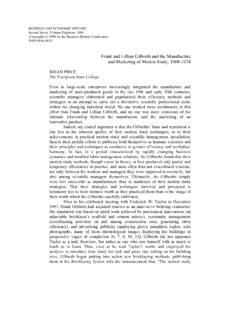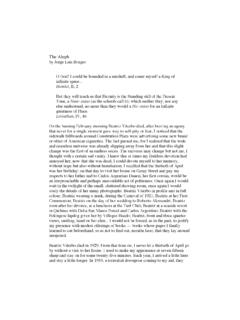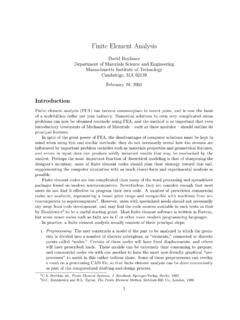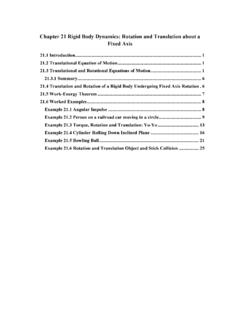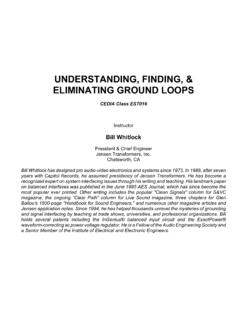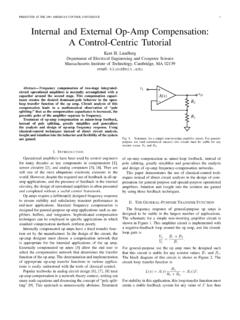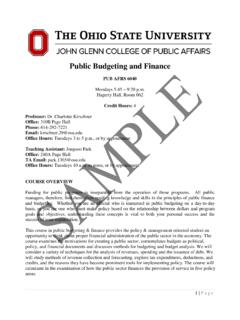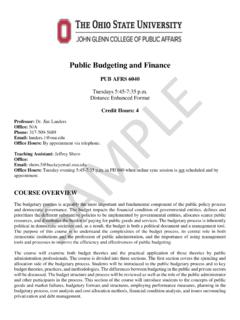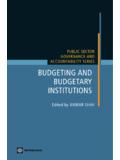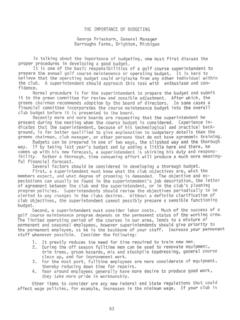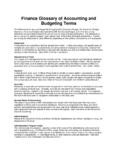Transcription of Innovative Budgeting and Finance for the Public Sector
1 Innovative Budgeting and Finance for the Public Sector Spring 2016 Meeting time: Tuesdays and Thursdays, 9:30am 11am in Room 9-450A Instructor: Dr. Gabriella Y. Carolini Office hours: 3-5pm Tuesdays or by appointment, in my office (9-539). Course Description Governments across the globe grapple with adequately and effectively attending to Public Sector responsibilities for basic services with limited financial and human resources to do so. Particularly in the context of significant demographic shifts both in terms of rapid population growth as well as shrinkage - governments are searching for Innovative means of meeting Public Finance and planning challenges. This course provides an introductory framework for understanding typologies and methods of Budgeting , accounting, and financial mobilization in the Public Sector .
2 In addition to establishing financial literacy and familiarity with this basic tools portfolio, students will practice exercises to explore revenue and expenditure estimation strategies, build a knowledge base around how accounting systems and reports influence Budgeting dialogues and perceptions of Public Sector health, and study cases to understand pioneering examples of funding mobilization via taxation, capital markets, and experimental experiences with mechanisms such as land-value capture. The practical nature of the subjects covered in this course requires full attendance and active participation from students. Objectives By the end of the semester, students will have a globally comparative foundation of reference in Budgeting and financing experiences in the Public Sector .
3 More specifically, students will be able to: Understand Budgeting typologies and challenges in different income settings Conduct budgetary analyses; Connect data production (through accounting methodologies and objectives) to budget politics and fiscal health status. Formulate policy recommendations for funding capital investment budget requirements Evaluation A. Exercises (75%)* *Please note that you will need access to Excel spreadsheets to complete assignments. Students will complete three exercises (handed out in class) to establish fluency with: I. Estimation techniques for revenues and expenditures (25%) Due February 25th II. Budgetary analysis (25%) Due March 31st III. Financing infrastructure analysis and proposal (25%) Due May 12th B. Periodical analysis, Attendance, and Participation in Class (25%) Full attendance in class and participation in class discussion is central to this practice-based course.
4 In addition to the student s own initiatives in providing in-class feedback from assigned course readings, all students are required to identify and post six periodic articles on the Stellar Website under Forum - that concern Budgeting , accounting, and/or Finance for the Public Sector . Students may choose which six (distinct) weeks to which they will contribute a news article for class discussion, but will be required to post the article by 6pm on Sundays before class meetings on Tuesdays. All students are required to check the Forum discussion and read the periodicals posted before class on Tuesday morning. Course Readings All readings are available on , no excuses. I. Budgeting Wk 1 - Feb. 2 and Feb. 4: Cycle Overview, Typologies, and Country Comparisons Rubin, I. (2006) The Politics of Public Budgets , Chapter 1, in The Politics of Public Budgets: Getting and Spending, Fifth Edition.
5 CQ Press: Washington, Lee, R. et al (2013) Budgets and Budgeting Systems , Chapter 1, pp. 14-24, in Public Budgeting Systems. Jones and Bartlett Learning: Burlington, MA. Premchand, A. (1998) Budgetary Management in the United States and in Australia, New Zealand, and the United Kingdom , Chapter Four in Handbook of Government Budgeting , ed. R. Meyers. Jossey-Bass Press: San Francisco. Grizzle, G. (2001) Does Budget Format Really Govern the Actions of Budgetmakers? in Performance-Based Budgeting , eds. G. Miller, Hildreth, J. Rabin. Westview Press: Boulder, CO. Wk 2 - Feb. 9 and Feb. 11: Understanding, Projecting, and Challenges of Revenues Chen, G. et al (2009) First Steps in Revenue Estimating , Chapter 4 in Budget Tools. CQ Press: Washington, Fleeter, H.
6 And Lee Walker, L. (2003) Revenue Forecasting , in Case Studies in Public Budgeting and Financial Management, Second Edition, Eds. A. Khan and W. Bartley Hildreth. CRC Press/Marcel Dekker: New York. Kyobe, A. and Danninger, S. (2005) Revenue Forecasting How is it done? Results from a Survey of Low-Income Countries, IMF Working Paper Series, Fiscal Affairs Department WP/05/24. Benton, J. (2010) Chapter 4, Trends in Local Government Revenues: The Old, the New, and the Future, in Municipal Revenues and Land Policy, Lincoln Institute of Land Policy, Cambridge, MA. Povoledo, E. (2013) Italians Have a New Tool to Unearth Tax Cheats , in The New York Times, January 27, 2013. Cowan, (2013) Towns Next Hit from Hurricane is to Tax Revenue , in The New York Times, January 24, 2013.
7 Wk 3 - Feb. 18 (NO MEETING on Tuesday, February 16th): Understanding and Estimating Expenditure Requirements Chen, G. et al (2009) Preparing the Capital Budget , Chapter 5 in Budget Tools. CQ Press: Washington, Wigfall, P. and Lynch, T. (2003) Capital Budgeting Practices in Local Governments: A Comparative Study of Two States , in Case Studies in Public Budgeting and Financial Management, Second Edition, Eds. A. Khan and W. Bartley Hildreth. CRC Press/Marcel Dekker: New York. Steiss, A. (2003) Procedures for Programming and Financing Capital Improvements , in Case Studies in Public Budgeting and Financial Management, Second Edition, Eds. A. Khan and W. Bartley Hildreth. CRC Press/Marcel Dekker: New York. Balassone, F. and Kumar, M. (2007) Cyclicality of Fiscal Policy , in Promoting Fiscal Discipline, eds.
8 M. Kumar and T. Ter-Minassian. International Monetary Fund: Washington, Wk 4 Feb. 23 and Feb. 25: Budgetary Analysis: Searching for Equity and Efficiency **ASSIGNMENT 1 DUE February 25th** Bartley Hildreth, W. (2003) Equity and Budgetary Analysis: Determining Fair Shares of Local-Option Sales Tax Revenue , in Case Studies in Public Budgeting and Financial Management, Second Edition, Eds. A. Khan and W. Bartley Hildreth. CRC Press/Marcel Dekker: New York. Carolini, G. (2013) Perverting Progress? The Challenges of Implementing both Fiscal and Social Responsibility in S o Paulo (1995 2010) , in Urban Studies, 50(2) 356 371. Schick, A. (1990) Budgeting for Results: Recent Developments in Five Industrialized Countries , in Public Administration Review, Vol. 50, January-February, pp.
9 26-34. Caiden, N. (2010) Challenges Confronting Contemporary Public Budgeting : Retrospectives/Prospectives from Allen Schick , in Public Administration Review, Vol. 70, Issue 2, pp. 203-210. Stevenson, R. (2013) Governors Push Bigger Reliance on Sales Taxes , in The New York Times, January 24, 2013. Sachs, J. (2012) Today s Challenges go Beyond Keynes , in Financial Times, December 17, 2012. Wk 5 - March 1 and March 3: Budgetary Analysis Improving through Evaluative Power? Cothran, D. (2001) Entrepreneurial Budgeting : An Emerging Reform? , Chapter Eight in Performance-Based Budgeting , eds. G. Miller, Hildreth, and J. Rabin. Westview Press: Boulder, CO. Easterling, C. N. (2003) Performance Budgeting in Florida: To Muddle or Not to Muddle, That is the Question , in Case Studies in Public Budgeting and Financial Management, Second Edition, Eds.
10 A. Khan and W. Bartley Hildreth. CRC Press/Marcel Dekker: New York. F lscher, A. (2012) Country experience with Programme and Performance Budget Reforms: 6 mini case studies , Paper presented at the Collaborative Africa Budget Reform Initiative s 8th Annual Seminar: Budgeting for Results Moving Towards Performance Budgeting . Wk 6 - March 8 and March 10: Budgetary Analysis Innovating through Participation? Participatory Budgeting Exercises Zohdy, N. (2015) Evaluating the Inaugural Participatory Budgeting Process in the City of Cambridge. Master in Public Policy 2015 - Harvard University, John F. Kennedy School of Government. Prepared for the Participatory Budgeting Project (PBP) and the City of Cambridge Stripling, B. (2012) Should Democracy be Direct? in Public Administration Review, Early View/First Published Online: December 5, 2012.
